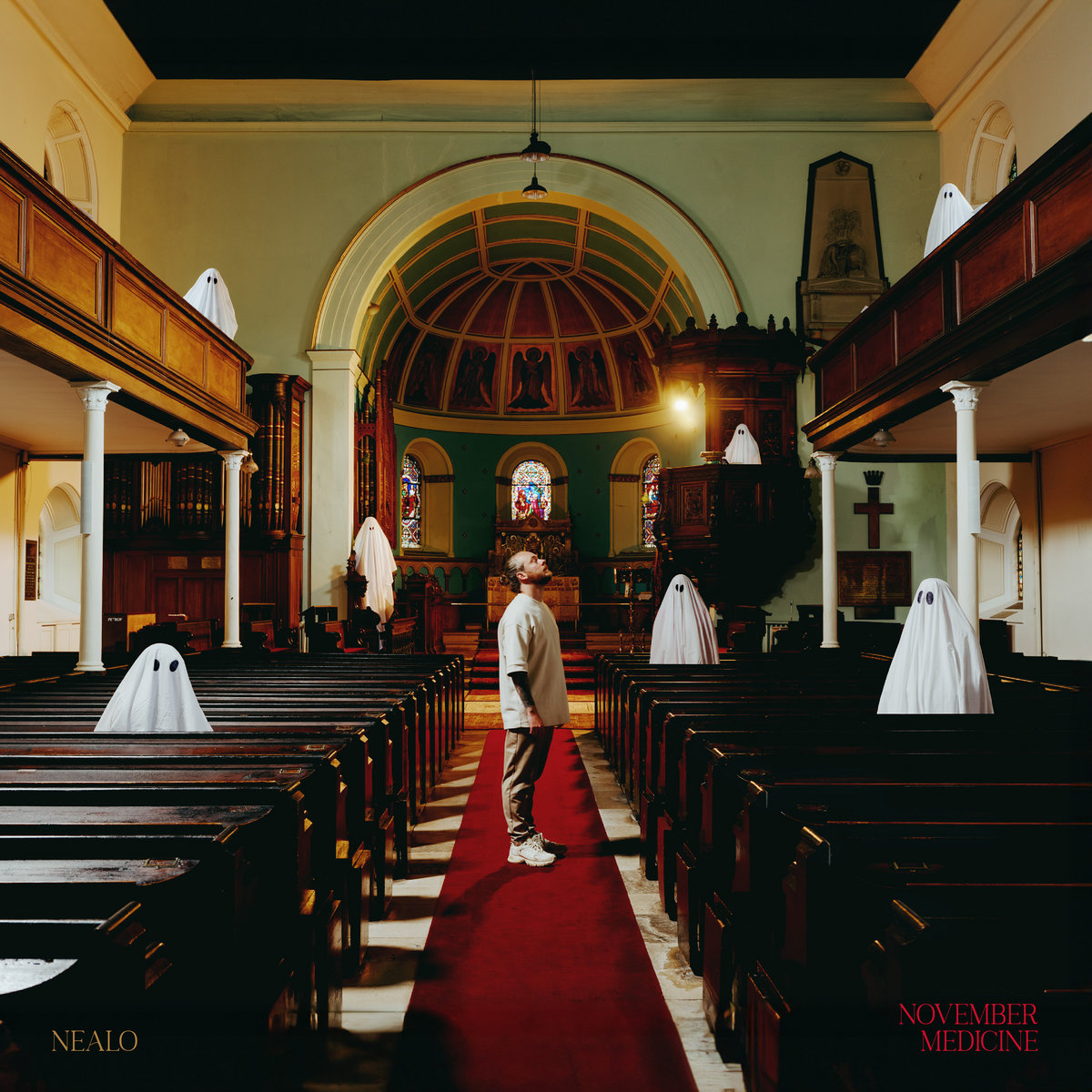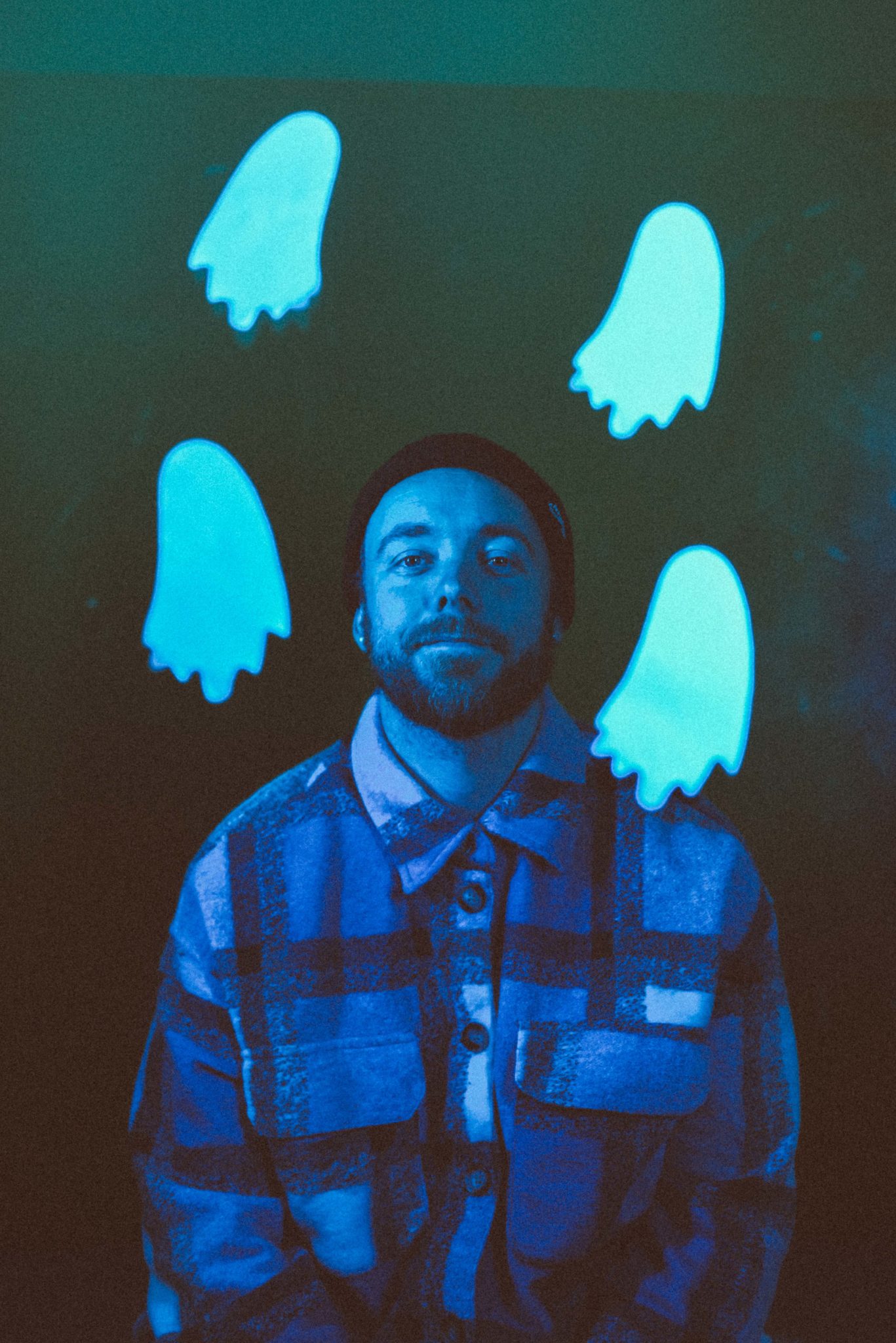- Music
- 01 Dec 23

Choice Music Prize-nominated rapper Nealo reflects on Irish hip-hop, injustice, the Church, the deeper conversations we need to be having about mental health in this country, and the tough times that shaped his new album, November Medicine.
Nealo’s fiercely vulnerable ruminations on life, love, loss and the state of his city tapped powerfully into the concerns of an entire generation, with the release of his debut LP, All The Leaves Are Falling, in October 2020. But even with a Choice Music Prize nomination for Irish Album of the Year under his belt, and the backing of an exceptionally devoted fanbase, when it came to the creation of his second album, the Dublin rapper found himself in headspace he not-so-affectionately refers to now as “The Basement.”
“A shithole that I was trying to climb out of – trying to get to a nicer place,” he elaborates. “I was in the worst place when I was writing a lot of it. Probably as low as someone can go, I’d say.”
Tackling personal problems, such as the breakdown of a ten-year relationship and his own struggles with depression, the project, November Medicine, ultimately served as a crucial form of catharsis for Nealo. Fresh from a photo shoot in the Hot Press office, he tells me he’s in a much better place these days – though his mental health is something he has to work on consistently.
“It’s always been a part of my life,” he explains. “I’ve always had to struggle with that. Even now, I don’t drink anymore, and I work out for an hour every single day religiously – and I still have to fight it every day.”
Advertisement
While work has been done in recent years to remove the stigma surrounding mental health issues, Nealo worries that a lot of conversations around the topic are merely ‘lip service’.
“There’s a lot of people who are like, ‘Just talk to someone’,” he reflects. “And then you do, nobody gives a fuck! Obviously your close circle do – but if I started moaning every single day online about having depression, people would just stop listening. So, to me, people saying, ‘Just talk to someone’, has always fallen short. It should be, ‘How do we fix this? What are the issues that are actually causing this?’
“Even trying to get help over here for myself, or seeing what my friends – and friends who killed themselves – have gone through… There’s no support. People are being turned away, or told, ‘Come back in four weeks’. They don’t have four weeks. Those people have today, and that’s it.”
For Nealo “having a purpose” is a big help – as are creative outlets, and a bit of healthy piss-taking.
“If you go to an Irish funeral, people are taking the piss and laughing,” he smiles. “There’s a beauty to that. We don’t take ourselves too seriously.”
Even the bedsheet ghosts that feature on the covers of his albums are a “little bit tongue in cheek”, he acknowledges – although they do also symbolise heavy topics, like death, loss of innocence, and disillusionment. They make a reappearance for November Medicine – this time inside a church.

Advertisement
“I tried like 15 churches!” Nealo says of the album cover shoot, which ultimately took place in Dublin’s Pepper Canister Church, a Church of Ireland building. “It didn’t help that the first article that came up when you Googled me was like: ‘Nealo takes aim at the Catholic Church…’ I had a couple of priests that definitely Googled that, and were like, ‘Yeah, this isn’t going to happen’. Catholic churches are way too precious!
“But that view from between the pews of a church just really reminds me of my childhood,” he adds. “A lot of us spent a lot of our childhood being dragged to Mass on Sunday. It’s such a visceral fucking image.”
Nealo considers himself spiritual rather than religious these days – though he feels that Ireland’s past relationship with the church is still informing our day-to-day present.
“A lot of the issues that Irish men have, come through the church,” he points out. “We don’t talk about stuff, and that comes out in weird behaviours with women, or weird behaviours with other men.”
A crucial way several members of his generation have engaged with these issues is through hip-hop – with an organic, community-oriented scene having emerged in Dublin in recent years, featuring Nealo and close friends like Mango, Rebel Phoenix, Jehnova and Wallfella.
“A few years ago, it looked like the hip-hop scene here was about to blow up,” Nealo reflects. “But it never really materialised. There’s a lot of reasons for that. I think we lack the infrastructure here to really support it.
“But that leads to people putting on their own gigs, because they have to,” he continues. “Building their own scenes. That’s something that we’ve tried to keep going.”
Advertisement

Nealo by Miguel Ruiz
He originally cut his teeth in the hardcore punk scene, so coming to hip-hop later in life means he still approaches the artform like a student.
“Lethal Dialect was the first person whose music I really fell in love with,” he says. “And then Kojaque showed everybody that they could do it. And then Limerick – God Knows, MuRli, Denise and all those people – they brought it to the next level. All of that happening gave me the encouragement to just give it a go.
“When I wrote my first album, I was learning how to rap, really,” he admits. “I had never really done it before. I was trying to get all these emotions out, but I wasn’t very eloquent.”
Having now honed his craft, November Medicine finds him delving into political and historical issues more directly than ever. The album’s second track, ‘Absent Hearted’, was written after George Nkencho was fatally shot by Gardaí in Clonee, not far from where Nealo is from.
But as he points out, tackling these major subjects, be it racism, misogyny, or other social issues, can come with some pushback.
Advertisement
“I think a lot of Irish men are afraid to come out and speak more on these kinds of things, because they’ll be looked at as ‘white knights’ or something,” he remarks. “I’ve had that said to me a few times, and it does hurt, because someone’s calling you insincere. It’s hard to navigate that.
“I feel injustice when it happens,” he continues. “It’s been a ridiculously hard place for women to live for hundreds, probably thousands, of years. And that’s only been acknowledged in the last 10 or 15 years. It’s just honest, acknowledging that – it doesn’t make you a better person to do it. It’s just the truth. And I think it’s better to talk about everything, rather than sweep it under the rug.”
He does, however, occasionally worry about sharing aspects of his own personal life in his music.
“It’s such a hard line to ride,” he admits. “It’s the same with other people who have written really personal stuff, like For Those I Love – I know David sometimes feels a lot of guilt. And I feel it too. It’s like, ‘Are you getting success out of tragic situations? Am I selling my depression, essentially?’
“And you kind of are, when you break it down!” he adds. “But that’s art. That’s where it comes from – hard shit. And it’s hard won. One of the most beautiful things in life is being able to transmute that hurt into something, like a song.’”
But as a fully independent artist now – who’s also balancing a full-time job and a young son – the album release has been testing, he tells me.
Advertisement
“Music these days is really hard, and if you struggle with your mental health anyway, it’s so difficult,” he says. “As opposed to other people who are selling products, we’re kind of selling ourselves. When the algorithm doesn’t pick it up as it should, you might get one hit – and then, the next one, which you think is better, doesn’t go anywhere. That fucking sucks.
“So I don’t know where the future lies for me, in terms of releasing music,” he concludes. “But I’m happy with this one. And I’m going to keep making music – and just see what happens…”
• November Medicine is out now. Nealo plays the Music Trail at Other Voices in Dingle this weekend (December 1-3).










